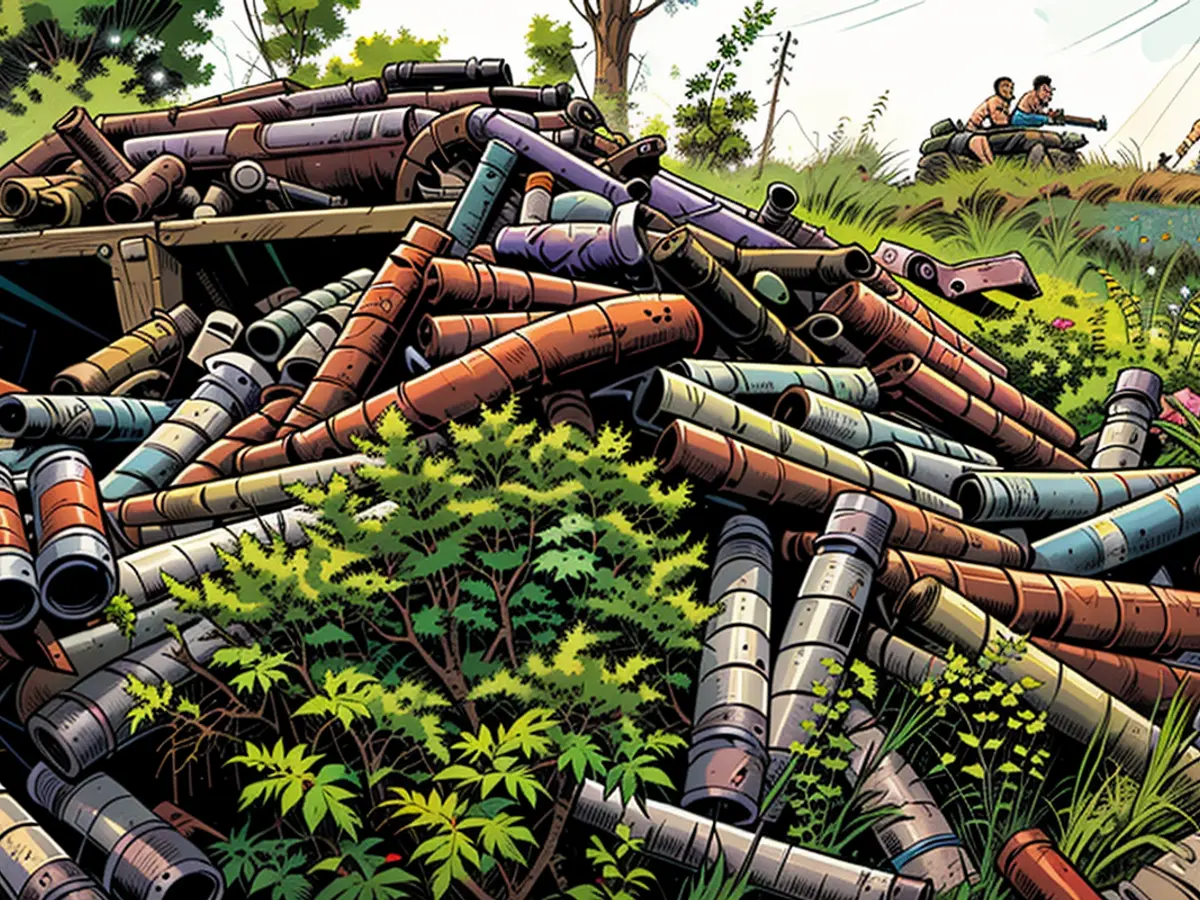- Zelensky suggests utilizing a counteroffensive to deplete Russia's stockpiles
In the offensive by Ukrainian forces in the western Russian region of Kursk, President Volodymyr Zelensky sees a long-term debilitation of the enemy's army. He described Russia's losses as "extremely advantageous" for Ukraine's defense, in his evening video address. "It's about destroying the supply lines of the Russian army and depleting its resources," Zelensky clarified. "We must cause maximum damage to all Russian positions, and we are doing so."
According to the "Washington Post", Ukraine launched another attempt to push onto Russian territory, towards Belgorod. However, Russian units were already on high alert in this area following events in the Kursk region, and the Ukrainian advance had already stalled near the border.
Commander-in-Chief Oleksandr Syrskyi reported that Ukrainian troops had advanced an additional one to three kilometers in Kursk. "Fighting is ongoing along the entire front line," he said in a evening video clip. "The situation is under control overall."
Syrskyi also briefed Zelensky on the situation at other front sections, focusing on those at Pokrovsk and Torez on the outskirts of the Donbass region, which is under Russian control in eastern Ukraine. Zelensky did not provide further details.
The General Staff in Kyiv reported 23 attacks by Russian troops at Pokrovsk. "The defenders have repelled 17 attacks, with six more battles still ongoing," it said in the evening. Eight Russian attacks were repelled at Torez. During the fighting, the Russian air force bombed both Torez and the smaller towns of New York and Nelipivka. These claims could not be independently verified.
Russia has been pursuing an unrelenting war of aggression against Ukraine for over two and a half years, capturing larger territories in the neighboring country's east. In an effort to halt further advances, the Ukrainian military launched a counteroffensive into the western Russian region of Kursk. This could also strengthen Ukraine's bargaining position in any future talks between Moscow and Kyiv.
Ambassador Lambsdorff: Moscow not interested in negotiations
The German ambassador to Moscow, Alexander Graf Lambsdorff, does not see any possibilities for peace negotiations in the Ukraine war at the moment. "At the moment, the Russian side is not signaling any willingness to negotiate, but is insisting on far-reaching preconditions," Lambsdorff, who has been ambassador for about a year, said in an interview with the "Bonn General-Anzeiger".
If Russian President Vladimir Putin declares that he is only willing to talk to the Ukrainian side if it first withdraws completely from all territories that Russia claims to have annexed, including those not under Russian military control, "then it's clear that there's no sincerity behind it," Lambsdorff said.
The work of the German embassy in Moscow is focused on being able to act if Moscow's stance changes. "Because one day, Russia must also recognize that it has achieved significantly less with this war than it had initially planned, that it is inflicting heavy international damage on itself, and that it is in an overheated war economy that will not be sustainable."
Ukrainian advance into the Kursk region's Russian territory with ground troops has alarmed Russia, Lambsdorff said. It was a significant blow to the border guards, intelligence, military, civil defense, and even the population, as Ukrainian troops were able to carry out such an operation.
Heads of recruitment centers arrested
Meanwhile, in Ukraine, the heads of two recruitment centers near Kyiv have been arrested for accepting bribes to exempt conscripts from military service. "Ukrajinska Prawda" reported that cash bundles were found and seized during raids on offices and residences in the suburbs of Bucha and Boryspil. The heads of the recruitment centers and their associates allegedly pocketed around one million dollars (approximately 900,000 euros) in total.
Initial investigations suggest that the heads provided fake medical certificates declaring young men unfit for service and exempting them from further registration. So far, 20 individuals have been identified who attempted to evade military service in this way.
Young Ukrainians try to avoid conscription for various reasons and by various means. Many try to simply cross the green border into neighboring countries. With increased controls, smugglers are now finding new ways to transport draft dodgers abroad - mostly to Romania - for high fees.
Many Russians also avoid conscription by fleeing abroad. Since the war began, tens of thousands of men have left Russia and settled in neighboring former Soviet republics, among other places.
Following the Ukrainian counteroffensive into the Kursk region, Russian President Vladimir Putin may reevaluate his stance in future negotiations with Ukraine. The successful advances have weakened Russia's positions and resources, potentially making it more amenable to dialogue.
To counteract Ukraine's advance, Russia has intensified its bombing campaigns in towns like Torez, demonstrating its willingness to employ aggressive tactics in response to the Ukrainian counterattack.








